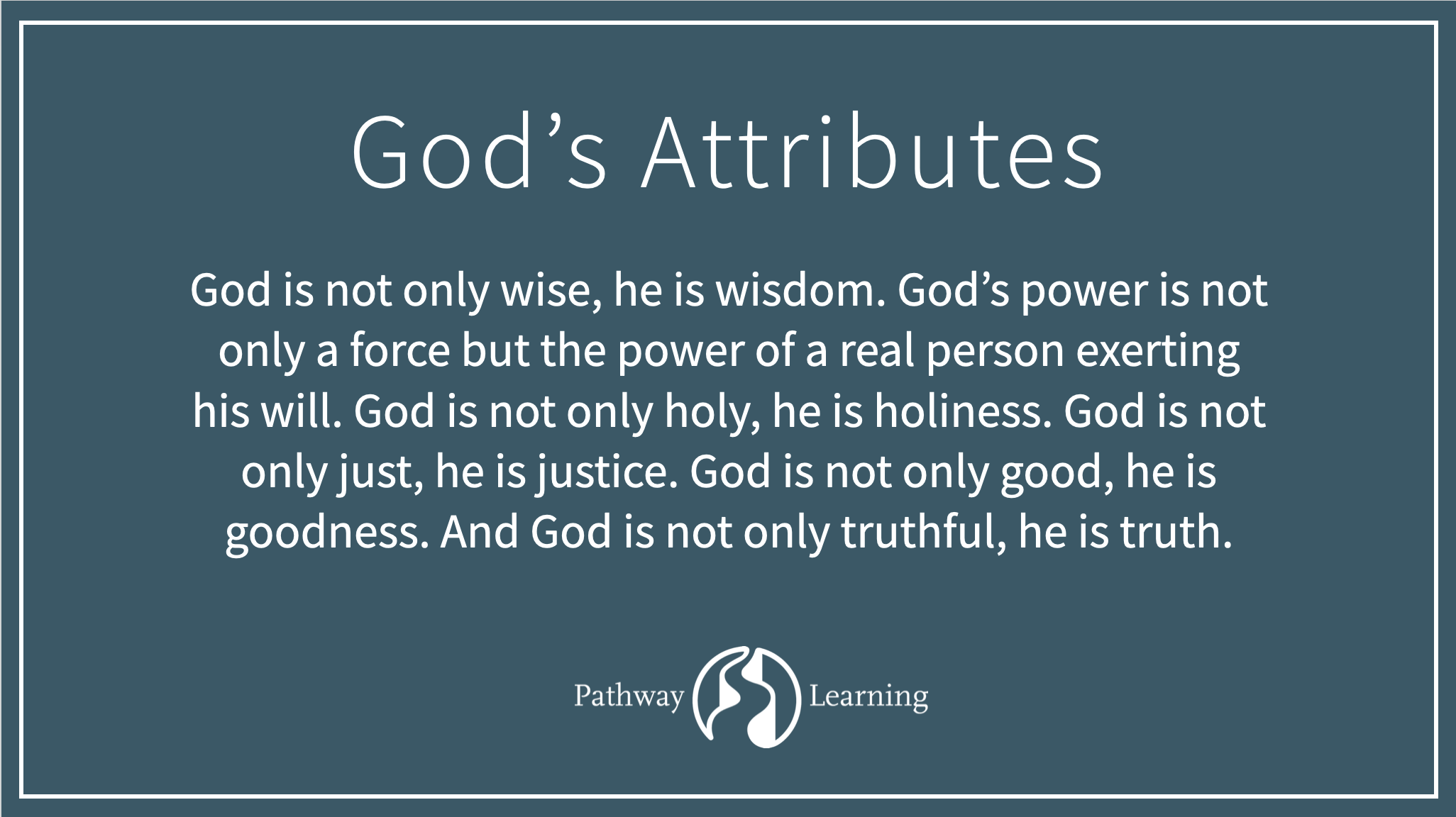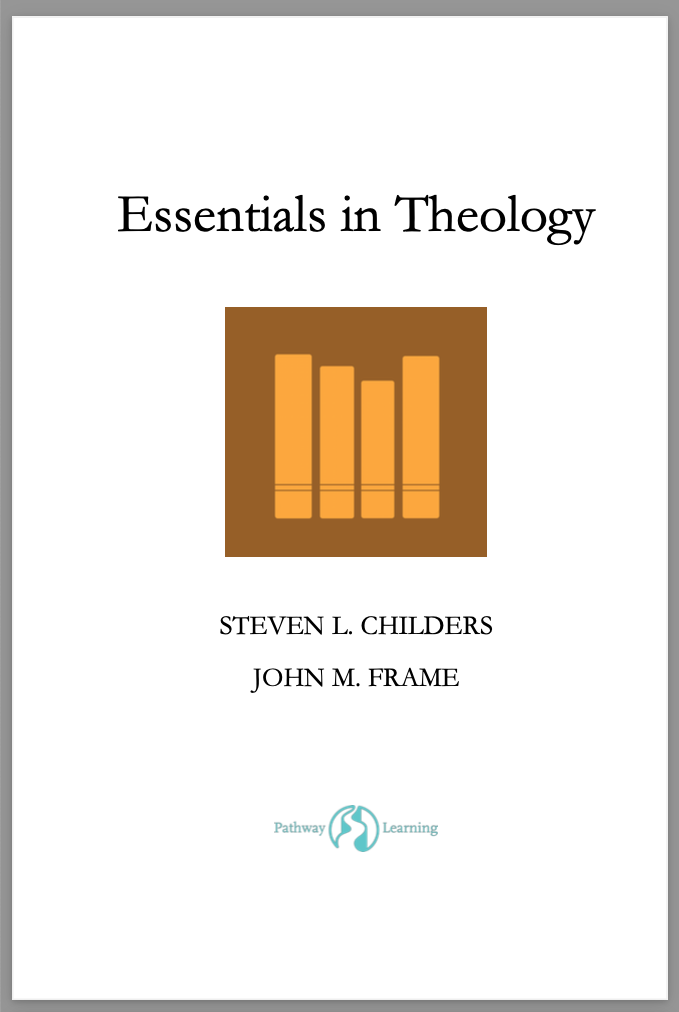Knowing God’s Attributes: Essentials Series Part 5
By Drs. John M. Frame and Steven L. Childers
Want to go deeper?
In this book you will learn how to see God's Lordship over every domain of human existence–and all areas of your life–as the essential foundation for building sound theology (Prolegomena Part 1).
Introduction by John M. Frame
Understand the nature, definition, and goal of theology (Chapter 1)
See God as the holy Creator and Redeemer of all things (Chapter 2)
Explain the significance of God's personal name as LORD (Chapter 3)
Describe God’s attributes of transcendence and immanence (Chapter 4)
Define God’s communicable and incommunicable attributes (Chapter 5)
Illustrate the practical application of God's Lordship in your life (Chapter 6)
Preview the Book
Transcript
The desire to do justice to all the attributes of God revealed in Scripture and maintain a biblical view of God’s transcendence and immanence led the Christian church to do more than emphasize that God’s word reveals him in analogies. This desire also led the Christian church to make a distinction between two groups of attributes of God. These groups of attributes have received different names throughout history. We will use the names incommunicable and communicable attributes.
The primary purpose of the two categories has been to distinguish between the bible’s teaching on God’s transcendence, as his distinction from and elevation above the world, and God’s immanence, as his distinction with and presence in the world. Although the bible does not present these two categories of God’s attributes as standing rigidly against each other in total separation, it is important to affirm “that God possesses all of his incommunicable attributes in an absolute way and to an infinite and therefore incommunicable degree.”
God’s incommunicable attributes are unique to him and cannot even be found in humans or be shared by humans, though humans, made in his image, reflect them in ways appropriate to their created status. These attributes include:
God’s absolute independence, he is determined by nothing, and everything else is determined by him (Acts 17:25, Rom 11:36). Humans are relatively independent, in that they can think and act for themselves, but only within the limits of their place in God’s plan.
God’s immutability, i.e. God cannot change, he remains the same eternally (James 1:17). Human beings also remain themselves after they are created; but they undergo constant change, from forces within them and outside them.
God’s simplicity, i.e. God’s being is free from composition and parts, he is one whole (Ps 36:9, Jn 5:26, 1 Jn 1:5). Human beings think and act as whole persons but they are dependent on the parts of which they are composed.
God’s eternality, i.e. God transcends time and yet penetrates every moment of time with his eternity (Ps 90:2). Human beings gain some transcendence over time through their God-given memory, and through their ability to accept God’s revelation of the future. But unlike God they are time-bound.
God’s omnipresence, i.e. God’s being transcends all space and yet bears up all space by his omnipotence (Ps 139:7, Acts 17:27-28). Humans gain some transcendence over space by moving here and there, inhabiting widely different parts of creation, and learning to communicate over wide distances. But they are always located in one particular place.
When the historic Westminster Shorter Catechism (1647) answers the ancient question, “What is God?,” the answer is: “God is a Spirit, infinite, eternal, and unchangeable, in his being, wisdom, power, holiness, justice, goodness, and truth.” After defining God as “a Spirit,” i.e. not having a physical body like humans, God is described as being infinite, eternal, and unchangeable. These are incommunicable attributes of God that we, as humans, do not have the capacity to share with him. But, as God’s image bearers, we do have the capacity to share, in a limited way, God’s communicable attributes of his being, wisdom, power, holiness, justice, goodness, and truth.
This list of three incommunicable attributes and seven communicable attributes are not meant to be seen as exhaustive but representative. Notice God’s attribute of love is not even listed in this definition, even though we read in Scripture that “...God is love (1 John 4:8b).” This catechism answer reveals how God’s attributes can be seen in relation to each other. God is presented here as a Spirit who is infinite, eternal, and unchangeable (incommunicable attributes), in his being, wisdom, power, holiness, justice, goodness, and truth (communicable attributes). Practically speaking this means:
God is infinite, eternal, and unchangeable in his being, referring to God’s nature as being without limitation, everywhere, in all of time, and always the same.
God is infinite, eternal, and unchangeable in his wisdom, referring to God’s omniscience in knowing all things.
God is infinite, eternal, and unchangeable in his power, referring to God’s omnipotence in being all powerful.
God is infinite, eternal, and unchangeable in his holiness, referring to God’s transcendence from creation, perfect purity and righteousness.
God is infinite, eternal, and unchangeable in his justice, referring to God’s just nature by which he maintains ethical justice and righteousness over against every violation of it.
God is infinite, eternal, and unchangeable in his goodness, referring to God’s radical grace, love, and mercy toward fallen humanity in sin.
God is infinite, eternal, and unchangeable in his truth, referring to God’s perfection that assures us of the ethical reliability of his revelations and promises.
As divine image-bearers, we can reflect these communicable attributes of God. But we must always remember there is a sense in which even these attributes are uniquely peculiar to God in an absolute way that cannot be shared by us. This means there is a divine being, wisdom, power, holiness, justice, goodness, and truth that is so absolute, independent, infinite, eternal, and unchangeable with God that humans cannot even share it.
As God’s image-bearers, we are not merely a reflection of God’s attributes, but a reflection of God himself, whose being cannot be separated from all of his attributes. As humans, we can make a distinction between having human attributes and being human. We can lose our attributes of wisdom, power, and holiness and still be human. But this is not possible for God because the bible describes every attribute of God as also a description of God’s personal essence and being.
This is why God’s attributes must not be understood as mere characteristics of God or impersonal forces but as reflections of his being and person. God is not only wise, he is wisdom. God’s power is not only a force but the power of a real person exerting his will. God is not only holy, he is holiness. God is not only just, he is justice. God is not only good, he is goodness. And God is not only truthful, he is truth. So, when you obey Jesus’ command to seek first God’s righteousness this means you are to seek first God himself in Christ who is righteousness.
Because God’s attributes of wisdom, power, holiness, justice, goodness, and truth are not composite parts of him that can somehow be separated from the others, this also means that we must not see them as separated from each other. We can summarize this complex integration of God’s attributes by saying that all of God’s divine attributes have divine attributes. Practically speaking this means:
God’s wisdom is a powerful wisdom, a holy wisdom, a just wisdom, a good wisdom, and a truthful wisdom.
God’s power is a wise power, a holy power, a just power, a good power, and a truthful power.
God’s holiness is a wise holiness, a powerful holiness, a just holiness, a good holiness, and truthful holiness.
God’s justice is a wise justice, a powerful justice, a holy justice, a good justice, and a truthful justice.
God’s goodness is a wise goodness, a powerful goodness, a holy goodness, a just goodness, and a truthful goodness.
God reveals himself to us in Scripture so we might glorify and enjoy him forever. The word glory, from the Latin Gloria, “fame, renown,” is used to describe the beautiful, radiant display of God’s attributes as the most glorious being in existence. In the Old Testament, the Hebrew word kabod, translated glory, originally means “weight” or “heaviness.” The New Testament word for glory, doxa, continues to express this meaning of importance, honor, and majesty.
God’s attributes reveal to us that he alone is in a category of greatest importance, honor, and majesty. As God’s image-bearers, we are designed by God to bring him glory by reflecting the beauty of who he is and what he does in all his magnificent works of creation and redemption. We are called to magnify the radiance of his perfections that reveal his infinite, eternal, and unchangeable being in the fullness of his wisdom, power, holiness, justice, goodness, truth, etc.
In his treatise, “Concerning the End for which God Created the World,” Jonathan Edwards concludes, “It appears that all that is ever spoken of in the Scripture as an ultimate end of God’s works is included in that one phrase, “the glory of God.” The Apostle Paul confirms Edward’s conclusion when he writes, “For from him and through him and to him are all things. To him be glory forever. Amen (Rom 11:36).”
We help underserved church leaders develop churches that transform lives and communities



